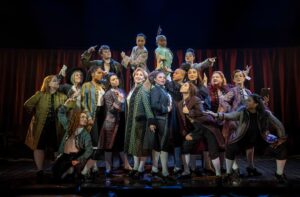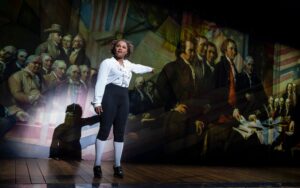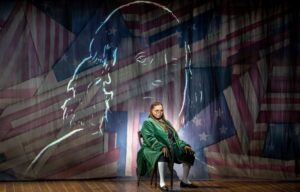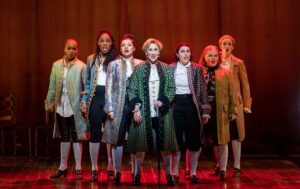1776
Sherman Edwards (Music & Lyrics); Peter Stone (Book)
Broadway San Jose

How familiar does this sound? A Congress that seems to get nothing done. A Congress that is divided into two factions that can barely tolerate each other. Committees upon committees where members of Congress meet to debate ad nauseum and decide little. Members of Congress debating who should and should not be considered citizens of the United States, focusing particularly on a minority.
While the above descriptions have a depressingly contemporary ring to them, they are right out of the script of Peter Stone’s (book) and Sherman Edwards’ (music and lyrics) 1969 Tony-winning Best Musical, 1776, a dramatization of the Continental Congress’s final month leading up to the eventual signing of the Declaration of Independence. In the current, national tour of 1776 now in a too-short, Broadway San Jose run at the San Jose Performing Center for the Arts, that history is told by those who were largely overlooked and whose liberties were ignored by the founding fathers. In this 1776, those white men so hallowed in our history have been replaced by a cast of those with mixed race, ethnicity, and gender and with all members identifying as either female, transgender, nonbinary, or gender non-conforming. The result is that the history lesson takes on powerful, current implications and comparisons, making this 1776 the best version I personally have ever seen.

1776 focuses on the efforts of John Adams as he tries to persuade his colony-representing colleagues to vote for independence from the British crown. Adams’ goal is hindered by a personality that is bellicose and pushy. In fact, he is generally considered – as sung time and again by his colleagues – “obnoxious and disliked.”
Gisela Adisa immediately fits the bill for the role as she trumpets in piercing clarity Adams’ call for “Vote yes … Vote for independency” while the rest of his colleagues in harmony sing for him to “Sit Down, John.” With fiery eyes, fierce flailing of arms, and a reluctance ever to be silent and listen patiently to others, her clarion-voiced Adams commands the stage with an almost overwhelming presence – in just the way we might imagine the real John Adams would have done.
But Gisela Adisa’s John also has a much softer side — although still persistent and somewhat stubborn — as seen whenever he converses through written letters with his wife, Abigail (played with a singing voice of stunning vibrancy by Tiesha Thomas). Their duets (“Till Then,” “Yours, Yours, Yours”) allow both actors to demonstrate their individual, rich tones that together emote an emotion and connection most married couples would envy.
A small edit in this production to the original script – but one in many ways gigantic in effect – has been allowed by the estates of the musical’s creators, Edward and Stone. Included in this production’s book are the words of one of Abigail’s many letters to John – words that acknowledge that in 1776, she recognized the inequality inbred in Congress’s debates about freedom. Abigail tells her husband, “[As you declare independency] remember the ladies … do not put such unlimited power into the hands of the husbands; remember all men would be tyrants if they could.” Further she adds, “[We] will not hold ourselves bound by any laws in which we don’t have any representation.” That addition is just the first of several by that this highly diverse, non-male production that the founders declared independence so that only all “men” – actually, all white men – could pursue “life, liberty, and the pursuit of happiness.”

An impressive cast of twenty-two represents the famous and not-so-famous founders as they sweat through the sticky hot, fly-infested summer of 1776 Philadelphia, often arguing to the point of fisticuffs before resorting to another round of rum. Sure to be everyone’s favorite is Liz Mikel’s Benjamin Franklin. Not only does she have the expected body shape, full cheeks, and bifocaled eyes to play the old coot’s part; but she also delightfully portrays the sometimes tottering but other times spry old sage who is prone-to-nap but quick-to-quip and who is overall liked-by-all. With just enough rasp in her voice to provide face validity to the inventor of stoves, Liz Mikel sings with the gusto one would expect from this most unique character of our history.
The first act of 1776 has several, perennial crowd-pleasers due to clever lyrics full of puns and alliterations as well as tunes that are catchy and memorable (e.g., “Sit Down, John,” “Piddle, Twiddle,” “But, Mr. Adams”). But as is often the case, in this production the one that really brings down the house is “The Lees of Virginia,” where Ben Franklin and John Adams are joined by Richard Henry Lee in a number full of Vaudeville-like antics. With a big, boisterous voice that resoundingly booms as she sings, Shawna Hamic thoroughly delights as she hilariously bounces all over the stage before RHL heads to Virginia to bring back “a resolution for independency.”
Almost every colony’s delegate gets a chance to demonstrate quirks and biases as they create idiosyncratic personalities of the congressional delegates. Particularly memorable are the thick-accented, red-haired Scotsman Colonel Thomas McKean of Delaware (Dawn Cantwell); the rum-loving codger Stephen Hopkins of Rhode Island (Julie Cardia); the commanding presence of Congressional President John Hancock (Oneika Phillips); and the rotund Samuel Chase of Maryland prone to be eating rather than listening (Lulu Picart).

In the second half’s “Momma, Look Sharp,” the courier who has been trudging in and out of the heated deliberations to give increasingly bad news from General Washington describes in a haunting, heart-breaking number how a friend’s mother looks for her son’s body after the Battle of Lexington. Brooke Simpson sings with the soft, plaintive voice of a distressed youth as black-clad figures representing all the mothers who have lost their sons look on, with one tall figure absolutely piercing the air with a forever-sustained note of grief, whose sadness hangs in the air long after the sound of her cry dissipates.
In the several other productions of 1776 that I have seen in the past several decades, one number that sometimes just does not work well and seems to divert the musical in ways not intended is “Molasses to Rum.” It is a number where the Edward Rutledge of South Carolina accuses his Northern colleagues (especially Bostonian John Adams) of massively profiting from the South’s slavery trade through their shipping industries. However, in this production Directors Jeffrey L Page and Diane Paulus have created one of evening’s most impactful, memorable moments. Kassandra Haddock converts Rutledge’s highly aristocratic, smooth-talking, slow-moving Southern drawl into a thunderous singing voice that rumbles to the point of being startling. As she sings the word “slave,” the snarly, snide hiss of a serpent clearly can be heard.
Looking at John Adams, Rutledge asks, “Molasses to rum to slaves, who sail the ships to Boston laden with gold, see it gleam?” before declaring in a damning voice sung strong, “Mr. Adams, I give you a toast: Hail Boston! Hail Charleston! Who stinketh the most?!” The shocking and difficult capstone is a concluding scene of a slave market with pounding, frightening moves made by a stage-full of buyers bidding on the bodies of five, Black bodies dancing precariously in the center.

Jeffrey Page has choreographed impressive numbers throughout but particularly scores in the precisely danced minuet “Cool, Cool Considerate Men” where the conservatives move as one highly coordinated unit, “to the right, ever to the right, never to the left.” Joanna Glushak is excellent as the strong-minded, strait-laced, never-budging loyalist to the Crown, John Dickenson of Pennsylvania, who sings with a voice that resounds in moral righteousness, arrogance, and superiority of opinion.
When John Adams loses the fight to keep Jefferson’s anti-slave clause in the Declaration of Independence (having been told by Franklin “it is a luxury we can’t afford”), Oneika Phillips sings “Is anybody there? Does anybody care?” with a voice that cuts to the core of one’s soul. In this production featuring representatives of those largely left out of the founding document, it seems as if Adams is looking to the future to see if someone else will take up the cause of equality for all in the future. As scenes of future generations of all colors and walks of life flash before us in a collage of projections, the document is signed and Adams’ words are repeated in a haunting final scene as the signers themselves look off into future’s horizon.
Such is the power and impact of this non-traditional, touring production. What a shame that it is only in San Jose for less than a week and that the sixteen-city tour does not include a staging in near-by San Francisco. In any case, this is a must-see production in the few days left.
Rating: 5 E, MUST-SEE
1776 continues through May 21, 2023, in touring production hosted by Broadway San Jose at the San Jose Center for the Performing Arts, 255 Almaden Boulevard, San Jose. Tickets are available online at https://broadwaysanjose.com or in person or by phone (408-792-4111) Tuesday – Saturday, noon – 5 p.m. at the box office, 135 W. San Carlos Street.
Photo Credits: Jane Marcus
